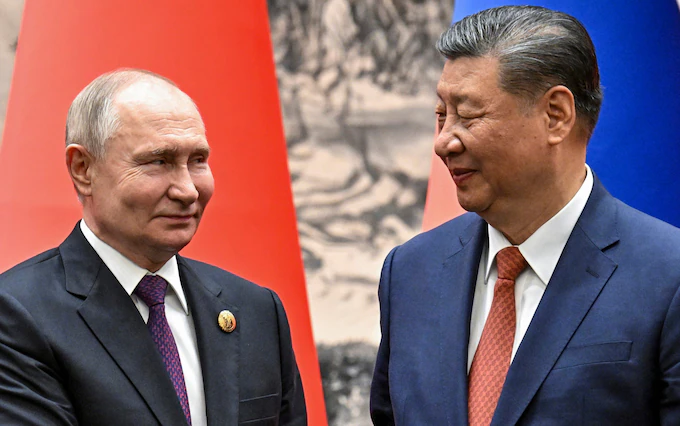“I don’t think anyone at this table has any idea of how to use it effectively and therefore we don’t use it,” said the Oracle of Omaha on Saturday at his annual gathering, discussing his cash hoard, which increased to $189bln from $168bln in Q4, 2023. He’s been parking it in 3- and 6-month Treasury bills. “We only swing at pitches we like,” said Buffett. “When I look at equity markets and the composition of what’s going on in the world, we find cash quite attractive.”
Overall: “We’re always going to do what we think is the right thing for the economy,” said Jerome Powell, annoyed, but classy as always. “It’s hard enough to get the economics right here,” he explained, swatting away the pesky reporter with a bit of false modesty. Every four years, overeager young journalists attempt to get the Fed Chairman to admit the institution is influenced by presidential politics. They long for their moment of glory, a hero-nerd’s version of the “You can’t handle the truth” interrogation of Jack Nicholson by Tom Cruise in A Few Good Men [here]. “This is my fourth presidential election here,” said Powell. “Read all the transcripts and see if anybody mentions in any way the pending election,” he said, as if that matters. Everyone in Washington is obsessed by the election. And from what I hear, nearly all are as determined to do everything possible to deny Trump a second term, as they are repulsed by the Democrat’s inexplicable failure to replace Biden on their ticket. The Federal Reserve’s twelve voting members are just as capable of weighing the effect of their decisions on the election without explicitly mentioning it, as they are at considering the impact of US monetary policy on the Bank of Japan’s increasingly tenuous situation without talking about it directly. So, for instance, the Bank of Japan intervened massively this week to stem the yen’s collapse, and this quite obviously was on Powell’s mind when he reassured markets that the Fed is not considering further rate hikes, which would intensify downward pressure on the yen. A disorderly decline in the yen would force the Bank of Japan to hike rates substantially, which would cause utter havoc in global stock and bond markets. The Fed will do whatever necessary to prevent this ahead of November’s election. And a stock market crash this autumn would pressure Powell to slash rates, but he really can’t with US inflation on the rise. And this quandary would itself cause market panic. But you see, no one need discuss any of this in a Fed meeting, because everyone but overeager young journalists already knows it.
Week-in-Review: Mon: MOF appears to have intervened as USDJPY spikes above 160 in thin holiday trading, Netanyahu accepts latest proposal from mediators that increases chance of deal w/ Hamas, Apple has renewed talks with OpenAi about deploying its tech into IOS, US treasury lifts Q2 borrowing estimate to $243b ($41b more than prev) – citing weaker cash receipts as the rationale, following Musk’s unannounced trip to China over the wknd - TSLA receives in-principle approval to deploy its ‘driver assistance’ system in China, ECB’s Wunsch expresses caution about signaling a second consecutive rate cut in July, Ukrainian drones strike large Russian refinery, Germany CPI 2.4% (2.3%e), US Dallas Fed mfg activity -14.5 (-11.2e), S&P +0.3%; Tue: China’s Politburo meets – sets 3rd plenum / sends clear pro-growth message, CZ sentenced to 4m in prison, Israel won’t join ceasefire talks until Hamas responds to latest truce proposal, EU escapes recession as Q1 GDP surprises higher (0.4% vs 0.2%e), ECB’s Villeroy says the CPI print feeds confidence for a June cut, Japan Jobless rate 2.6% (2.5%e) / Ret sales 1.2% (2.4%e) / IP -6.7% (-6.3%e), China PMI mfg 50.4 (50.3e) / serv PMI 51.2 (52.3e) / Caixin mfg 51.4 (51e), France 1Q GDP 1.1% (0.8%e) / CPI 2.2% as exp, Germany ret sales -2.7% (-0.7%e) / unemp 5.9% as exp / 1Q GDP -0.2% as exp, EU CPI 2.4% as exp / Core 2.7% (2.6%e) / 1Q GDP 0.4% (0.2%e), Mexico 1Q GDP 1.6% (2.3%e), Canada GDP 0.8% (1.1%e), US ECI 1.2% 1Q (1%e), US C/S home prices 7.29% (6.7%e), US Chicago PMI 37.9 (45.0e), US Cons conf 97 (104e), S&P -1.6%; Wed: Fed unch as exp / announces reduced taper to $25b UST per month (from $60b) – MBS unch / Powell suggested hikes are very unlikely versus a cut could be prompted by slowdown in growth alone, Senate approves legislation banning impt of enriched uranium from Russia, Ukraine hits another refinery, MOF appears to have likely intervened again during illiquid hours post FOMC, UK Nationwide house Px 0.6% (1.2%e), UK PMI mfg 49.1 (48.7e), US ADP emp change 192k (183k e), US PMI mfg (final) 50.0 (49.9e), US JOLTS job openings 8488k (8680k e), US ISM mfg 49.2 (50.0e) / Prices paid 60.9 (55.4e), S&P -0.3%; Thu: AAPL sets new record with largest ever share buyback announcement ($110b)/ provides upbeat guidance, US intelligence says Russia/China working closely on military issues including potential invasion of Taiwan, Biden says he defends the rights of peaceful protests but warns against violence as conflicts escalate across US universities – 2100 arrested, ECB’s Stournaras considers 3 cuts in 2024 as base case (4 prev), EU PMI mfg (final) 45.7 (45.6e), US Initial claims 208k (211k e), US Unit labor costs 4.7% (4%e), US Trade balance -$69.4b (-$69.8b e), US Factory orders 1.6% as exp / durable goods orders 2.6% as exp, S&P +0.9%; Fri: NFP 175k (240k exp) / unemp 3.9% (3.8%e) / AHE 3.9% (4%e), strong Chinese equity rally is pushing CNH stronger, Fed’s Goolsbee says jobs report gives confidence the economy is not overheating, Turkey CPI 69.8% (70.10%e) / Core 75.81% (75.70%e), EU unemp 6.5% as exp, USD serv PMI (final) 51.3 (51e) / comp 51.3 (51e), US ISM Services 49.4 (52e) / prices paid 59.2 (55e), S&P +1.3%; Fri Night: Navy men’s lacrosse loses to Lehigh 12-8 in Patriot League semi-finals (ending the season).
Weekly Close: S&P 500 +0.5% and VIX -1.54 at +13.49. Nikkei +0.8%, Shanghai +0.5%, Euro Stoxx -0.5%, Bovespa +1.6%, MSCI World -0.4%, and MSCI Emerging +1.1%. USD rose +4.2% vs Bitcoin, +2.9% vs Ethereum, +0.1% vs Canada, and +0.1% vs India. USD fell -3.3% vs Yen, -1.6% vs South Africa, -1.2% vs Chile, -1.2% vs Australia, -1.1% vs Mexico, -1.0% vs Sweden, -0.9% vs Brazil, -0.8% vs Indonesia, -0.6% vs Euro, -0.5% vs Turkey, -0.4% vs Sterling, -0.3% vs Russia, and -0.1% vs China. Gold -1.6%, Silver -3.1%, Oil -6.8%, Copper -0.4%, Iron Ore -2.7%, Corn +2.3%. 10yr Inflation Breakevens (EU -4bps at 2.11%, US -7bps at 2.36%, JP flat at 1.45%, and UK -2bps at 3.73%). 2yr Notes -18bps at 4.82% and 10yr Notes -16bps at 4.51%.
April Mthly Close: S&P 500 -4.2% and VIX +2.64 at +15.65. Nikkei -4.9%, Shanghai +2.1%, Euro Stoxx -1.5%, Bovespa -1.7%, MSCI World -3.9%, and MSCI Emerging +0.3%. USD rose +17.1% vs Ethereum, +14.3% vs Bitcoin, +4.3% vs Yen, +3.6% vs Brazil, +3.5% vs Mexico, +3.4% vs Sweden, +2.6% vs Indonesia, +1.8% vs Canada, +1.2% vs Euro, +1.0% vs Sterling, +0.9% vs Russia, +0.7% vs Australia, +0.3% vs China, +0.1% vs Turkey, and flat vs India. USD fell -1.9% vs Chile, and -0.5% vs South Africa. Gold +2.9%, Silver +5.9%, Oil -0.6%, Copper +13.0%, Iron Ore +12.8%, Corn -1.7%. 10yr Inflation Breakevens (EU +9bps at 2.15%, US +8bps at 2.40%, JP +12bps at 1.42%, and UK +12bps at 3.77%). 2yr Notes +41bps at 5.04% and 10yr Notes +48bps at 4.68%.
2024 Year-to-Date Close: Argentina +43.7% priced in US dollars (+56.2% priced in pesos), Turkey +25.6% priced in US dollars (+37.6% priced in lira), Colombia +14.2% in dollars (+15.9% in pesos), Ireland +12% (+15.1%), Denmark +9.9% (+13%), Venezuela +9.8% (+11.8%), Netherlands +9.7% (+12.8%), Greece +8.8% (+12.3%), Russia +8.6% (+11.1%), HK +8.4% (+8.4%), Italy +7.8% (+10.8%), NASDAQ +7.6% in dollars, S&P 500 +7.5% in dollars, Taiwan +7.1% (+13.4%), Hungary +7.1% (+12.2%), Euro Stoxx 50 +5.9% (+8.8%), Malaysia +5.8% (+9.3%), MSCI World +4.8% in dollars, Japan +4.7% (+14.3%), Germany +4.5% (+7.5%), Spain +4.5% (+7.4%), Poland +4.5% (+7.6%), UK +4.4% (+6.2%), Saudi Arabia +3.2% (+3.2%), India +3.2% (+3.4%), Czech Republic +3.2% (+7.5%), Belgium +2.7% (+5.5%), France +2.6% (+5.5%), China +2.3% (+4.4%), Austria +1.7% (+4.5%), Canada +1.1% (+4.7%), Israel +0.5% (+4%), Russell +0.4% in dollars, Norway +0.3% (+7.7%), Philippines -0.6% (+2.6%), Singapore -0.7% (+1.6%), Chile -0.8% (+5.8%), Mexico -0.9% (-0.4%), South Africa -1.6% (-0.3%), Sweden -1.6% (+6%), Australia -2.8% (+0.5%), New Zealand -3.9% (+1.4%), Finland -4% (-1.3%), Korea -4.3% (+0.8%), UAE -5.6% (-5.6%), Indonesia -5.9% (-1.9%), Switzerland -6.2% (+1.2%), Portugal -8% (-5.4%), Brazil -8.3% (-4.2%), Thailand -10.1% (-3.2%).
Walk: The window is open, I thought, out for a long walk, warm spring day, a billion sparkling diamonds spread across Long Island Sound. Crypto rallied massively in Q1 but started trading heavy into the Bitcoin halving on April 19th. This weighed on traditional markets, which now tend to follow crypto. Inflation bottomed many months ago, and showed plenty of signs of rising, but the Fed, most investors, and Wall Street strategists wanted so badly for it to fall that they appeared to summon a lower CPI through prayer, blind faith, alchemy, anything. But they failed.
Walk II: Five crows harassed a hawk overhead, an apex predator vastly outnumbered, a chaotic aerial retreat, to fight another day, the key to living, to life. The realization in recent weeks that US rates would stay high affected markets in reasonable ways, although gold remained buoyant, supported by foreigners who seek to mitigate the risk, albeit remote, that the US and its allies will freeze their reserves someday in a dispute. Russia suffered a $300bln loss of reserves when it invaded Ukraine on Feb 24, 2022. Gold is +22% since then, Bitcoin is +66% (S&P 500 +18%).
Walk III: The yen had been declining at an accelerating pace. In one sense this is fine, because the Japanese government (and its proxies) owns so many US treasury bonds that when the dollar rallies it makes money, even if its citizens lose their international buying power. But Japan’s interest rates are 0.00%-0.10% and with US interest rates 5.25%-5.50% traders and investors who keep shorting yen and buying dollars will continue to do so unless the US cuts rates or Japan hikes them. But Japan now has such vast debts that it can ill afford even modest rate hikes.
Walk IV: The water is still clear, cold, unperturbed, as sailboats emerge from white plastic wraps like daffodils, returning to their slips, one by one, then all at once. With the US now unable to cut rates soon, and Japan reluctant to lift its rates, the only option left is FX intervention, which the BOJ did in size this week. Sometimes that works. When it does not, it reminds investors that as powerful as central bankers are, markets are apex predators. And when nature is out of balance, and bankers are weakened, markets restore balance swiftly, savagely, without regard for stability.
Walk V: When equities fall materially, the Fed normally cuts rates. But with inflation again on the ascent, having never returned to the 2% target, it would need to see significant equity losses before intervening now. Everyone knows this. Which means that we’re now in a risk window, where lower equity prices will tend to lead to lower prices, a reflexive process. But just because we’re in a risk window doesn’t mean that the market will fall. It merely means that we’ve entered a period of vulnerability very different from when markets believed inflation was falling.
Walk VI: By telling markets the Fed has no plans to hike further if the economy remains strong but will cut if there is any softness at all, Powell created an asymmetry where if the data goes his way markets will rejoice, but if the data does not, then investors will hesitate to price in more hikes. It’s a risky bet in that the biggest risk all central bankers face is that the markets challenge their authority. In this bet, Powell loses big if inflation moves higher and he is unwilling or unable to tighten policy. And so far, so good, Friday’s employment report went his way.
Walk VII: The air came alive, abruptly, a southernly wind, flags in full, seagulls banking tightly. Powell’s bet probably pays off, for a while at least. Israel, Iran, Russia, Ukraine, China, Taiwan, there’s been plenty to worry about, the wall of worry. And as excited as investors are about AI, markets have not yet felt like the bullish extremes we’ve seen in the past. Trillions are sitting in money market funds. So, it’s probably still a bit too soon for the savage, reflexive market decline that is now a growing possibility due to resurgent inflation. And I walked back to the office.
Anecdote: “I’m often asked what role international diversification should play in our portfolio,” said the CIO of a well-regarded US plan. “Twenty years ago, EM was really coming online. China, Asia, Brazil. That theme was a no-brainer, but it’s played out. EM has been a dog for a decade.” Chinese nominal GDP has risen 1,064% since it entered the WTO in Dec 2001, yet the Shanghai Composite index has gained just 80% (US nominal GDP +163% and S&P 500 index +340% in that time). “With US rates set to stay high, and the dollar strong, EM feels like dead money,” he said. “European demographics are horrible, energy policy is disastrous, the continent is deindustrializing, and there’s next to no tech innovation.” Europe has just three of the world’s top-50 largest tech companies. “The only thing going for Europe is that it’s cheap. But the world-leading companies are in the US. Margins and ROEs are higher, we lead in innovation.” Wealth creation. “Big compounders drove equity returns for the past century, the Amazon’s, Exxon’s, J&J’s.” They pull the sled. “When will Europe produce big compounders? Okay, maybe in obesity drugs, perhaps. But when’s the last time Europe created anything interesting?” As they say, the US invents, China produces, and Europe regulates. In a fracturing world, you don’t want to be Europe [read here]. “If US margins start compressing and ROEs decline, we’ll consider Europe, but not until,” he said. “As for Chinese investments, count us out. Xi is 70 and is committed to unifying Taiwan, so maybe we have till he’s 80. Assume double-digit returns there for the next decade with a 30% chance of a 100% loss along the way. It’s difficult to justify an investment under any reasonable scenario,” he said. “And the cost of excluding Chinese stocks isn’t high. They’re only a 3% weight in the MSCI ACWI.” Not much risk of tracking error. “Once we thought the chance of a European ground war was close to nil. Russia invaded and every investment there went to zero,” he said. “You get to explain that to stakeholders once, not twice.”
Good luck out there,
Eric Peters
Chief Investment Officer
One River Asset Management
Disclaimer: All characters and events contained herein are entirely fictional. Even those things that appear based on real people and actual events are products of the author’s imagination. Any similarity is merely coincidental. The numbers are unreliable. The statistics too. Consequently, this message does not contain any investment recommendation, advice, or solicitation of any sort for any product, fund or service. The views expressed are strictly those of the author, even if often times they are not actually views held by the author, or directly contradict those views genuinely held by the author. And the views may certainly differ from those of any firm or person that the author may advise, converse with, or otherwise be associated with. Lastly, any inappropriate language, innuendo or dark humor contained herein is not specifically intended to offend the reader. And besides, nothing could possibly be more offensive than the real-life actions of the inept policy makers, corrupt elected leaders and short, paranoid dictators who infest our little planet. Yet we suffer their indignities every day. Oh yeah, past performance is not indicative of future returns.





